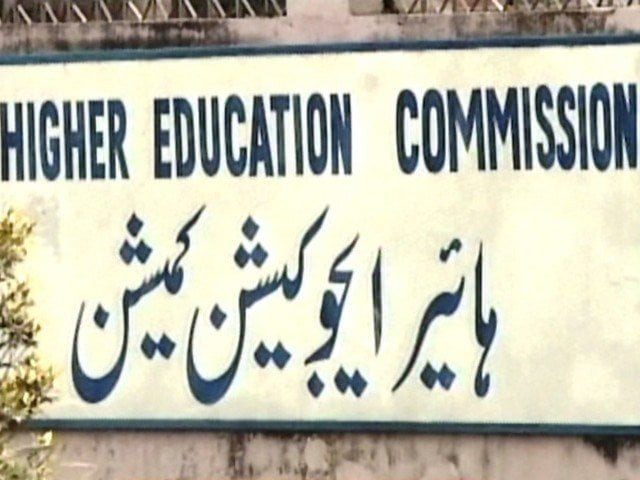Punjab to review HEC decision to end BA, MA programmes
Provincial authorities say they cannot replace the existing system within a year

Higher Education Commission. PHOTO: FILE
The Punjab Higher Education Commission (PHEC) has been told to review the decision and devise a strategy. The PHEC was asked to produce a report within a week and the provincial authorities will start consultations from Monday (today).
Punjab Higher Education Minister Syed Raza Ali Gillani ordered PHEC to review the letter of the HEC and submit the report. Replying to a question, the minister said the two-year BA and MA programmes would only be phased-out in the province, a per the letter of the HEC, after PHEC finalised the decision.

Talking to The Express Tribune, PHEC Director General Dr Shahid Soroya said it was not possible for Punjab to end the existing system within a year and replace it with a new one.
2018 programme: Applications invited for Fulbright scholarship
He added there were a large number of colleges in Punjab and such a change could not be made in a short span of time. Gilani said restructuring was needed in the college education system for these plans to transpire.
Dr Shahid said it was not possible to launch a four-year BS programme at every college of the province and the decision would be taken on a “case-to-case” basis.
Some colleges would offer the associate programme, whereas others would offer the BS programme. “We will consult the vice chancellors, private sector colleges, principals of public colleges and all stakeholders before submitting the findings to the minister,” said Soraya.
He added PHEC wanted to devise a workable plan that would not harm the education system, especially students.
The HEC, in a letter to universities and degree awarding institutions (DAI), was asked to comply with the orders of the commission and phase out the BA programme by 2018 and the MA programme by 2020. “The different titles for bachelor level degrees [BA and BSc] are creating confusion for employers, national and international organisations and the community as a whole,” the letter stated.
“For streamlining, HEC constituted a committee comprising experts from different universities/institutions to work on the possibility of phasing out BA/BSc programmes and to devise a mechanism to accommodate existing BA/BSc graduates into four year programmes,” the letter stated.
Highest Scores: HEC places IIUI in W-category
“The matter was taken up in the a meeting of the commission and was approved as a policy; therefore, it needs to be communicated to all the universities/DAIs of Pakistan for implementation within all HEIs in letter and spirit. All universities/DAIs are advised to comply with the commission’s endorsement to recommendations of the committee, constituted for the purpose of phasing out BA/BSc and bridging the existing BA/BSc graduates.”
Earlier on Saturday, HEC Chairman Dr Mukhtar Ahmed held a briefing on the issue. He said the decision to phase out the two-year BA and MA programmes was taken in 2004-5 to bring the education system of the country at par with international standards. He said the existing system would be replaced with the BS and two-year MS programmes which would be equivalent to 16 and 18 years of education, respectively. In 2007, he said the associate degree was added to facilitate the transition. “Later in 2014, a committee was constituted, which suggested issuing a deadline for the discontinuation of the programme. Finally in 2015, a commission approved the move. All stakeholders participated in the committee meeting,” he said.
Published in The Express Tribune, March 21st, 2017.



















COMMENTS
Comments are moderated and generally will be posted if they are on-topic and not abusive.
For more information, please see our Comments FAQ